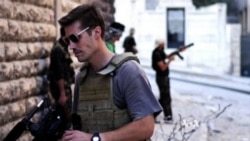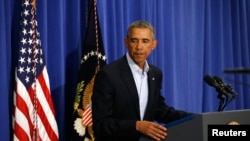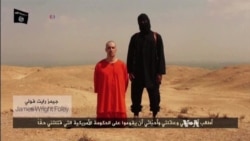U.S. military forces unsuccessfully tried to rescue a number of American hostages being held in Syria by Islamic extremists, the U.S. Defense Department said Wednesday. News reports said those hostages included the freelance journalist James Foley, whose beheading was shown in a video released Tuesday.
The Pentagon gave few details of the operation, declining to say when and where specifically in Syria it took place, or how many U.S. forces were involved.
The Washington Post, The Associated Press and other media said the operation took place earlier this summer.
“The United States attempted a rescue operation recently to free a number of American hostages held in Syria by the Islamic State of Iraq and the Levant (ISIL). This operation involved air and ground components and was focused on a particular captor network within ISIL,” the statement said. "Unfortunately, the mission was not successful because the hostages were not present at the targeted location."
White House officials told The New York Times that Special Forces commandos exchanged fire with militants, and one American was slightly wounded when one of the U.S. aircraft came under fire.
The grisly beheading of James Foley, a freelance journalist who had been held captive since disappearing in Syria in 2012, prompted wide outrage, including condemnation from President Barack Obama who called the Islamic State militant group that took credit for the execution a spreading "cancer" that must be eradicated.
"The entire world is appalled by the brutal murder of James Foley," Obama said earlier Wednesday. The United States "will continue to do what we must do to protect our people."
U.S. intelligence officials on Wednesday confirmed the authenticity of the video, which was released Tuesday and shows Foley being put to death. It also showed a second American journalist being held hostage, Steven Joel Sotloff, and included militants' threats to kill him.
The Sunni extremist group claimed it had killed Foley in retaliation for U.S. airstrikes targeting the group’s fighters in northern Iraq. The strikes, which began Aug. 8, helped rescue thousands of Yazidi refugees trapped on Mount Sinjar and helped Iraqis regain control of the country's main dam, near Mosul. In the hours after the video's release, the U.S. said it carried out nearly a dozen more airstrikes near the dam.
The 40-year-old Foley disappeared November 22, 2012, after being abducted in Syria by unidentified gunmen. He had reported in the Middle East for five years, for organizations including GlobalPost, and previously had spent six weeks in captivity in Libya.
Watch related video report by Henry Ridgwell:
It was not immediately clear where or when the execution took place.
Obama, in a brief televised appearance from the Massachusetts island of Martha's Vineyard, said he had telephoned Foley's family members in New Hampshire to say "we are all heartbroken at their loss."
The Islamic State militants, Obama said, "have rampaged" across swaths of Syria and Iraq.
"They abduct women and children and subject them to rape and torture and slavery,” he said.
'Extract This Cancer'
Obama also said the fighters had murdered people of all faiths, including Muslims. He called for a common effort – in Iraq, the Middle East region and elsewhere – "to extract this cancer so it does not spread."
French President Francois Hollande told Le Monde newspaper there should be a "global strategy" to counter the Islamic group, which he called well-structured, well-financed and well-armed with sophisticated weapons.
U.N. Secretary-General Ban Ki-moon condemned the killing as "an abominable crime."
Foley's killing has also drawn a sharp response in Britain, where counterterrorism police were trying to identify the journalist's killer. In the video, he spoke with a British accent.
Family Pays Tribute
The Foley family implored the kidnappers to spare the lives of other hostages, including Sotloff: "Like Jim, they are innocents. They have no control over American government policy in Iraq, Syria or anywhere in the world.''
Foley “gave his life trying to expose the world to the suffering of the Syrian people," said a Facebook statement attributed to his mother Diane Tuesday.
The Islamic State holds more hostages, including three American nationals and at least two British nationals, as well as others, according to the International Center for the Study of Radicalization at King’s College, in London.
U.S. State Department spokeswoman Marie Harf said the U.S. is aware of other Americans being held in Syria and that an estimated 12,000 foreign fighters have joined the conflicts in Iraq and Syria.
'Message to America'
In the video, titled "Message to America," Foley is shown wearing an orange, prison-style jumpsuit and kneeling in the desert as a masked man in black standing beside him holds a knife. The video was initially posted to YouTube, before being taken down late Tuesday by the video-sharing service.
“My message to my beloved parents: Save me some dignity and don’t accept any meager compensation for my death from the same people who effectively hit the last nail in my coffin with their recent aerial campaign in Iraq," he says.
The masked man denounces the U.S. government, saying it is "at the forefront of aggression toward the Islamic State" and he accuses the United States of interfering in its affairs.
"Today, your military air force is attacking us daily. In Iraq, your strikes have caused casualties amongst Muslims," the man says. "You are no longer fighting an insurgency. We are an Islamic army and state that has been accepted by a large number of Muslims from all walks of life, who have accepted the caliphate as their leadership."
The video then shows the man beginning to cut Foley’s neck before fading away and then finally showing Foley’s headless body.
Sotloff appears near the end of the nearly five-minute video. The man suggests that his fate rests with Obama.
More reaction on Foley
"This is an absolutely tragic and senseless killing of an innocent man who was just doing his job," Voice of America Director David Ensor said. "It isn't going to make any difference. It won't affect U.S. policy, in my view, it isn't going to make American journalist organizations stop covering the news."
IS and anyone else who is holding innocent prisoners – journalists or others – should free them immediately, Ensor said. "They will gain nothing from taking another innocent life.”
VOA constantly assesses the risks its journalists face while covering different news stories, he said.
"We have a lot of respect for our journalists and their judgment," he said. Risks are inevitable and "unfortunately, the world is a dangerous place."
Marquette University, where Foley graduated in 1996, said Foley "had a heart for social justice and used his immense talents to tell the difficult stories in the hopes that they might make a difference in the world."
Foley, who had also been held in Libya by forces loyal to Col. Moammar Gadhafi during the 2011 uprising, had worked for Agence France-Presse and the Boston-based media outlet GlobalPost. His last dispatch from Syria, in October 2012, for GlobalPost detailed the growing frustration with the war among Aleppo’s population.
Jonathan Adelman, associate professor at the University of Denver's Korbel School of International Studies, said the execution was a response by IS to its recent battlefield setbacks.
"To say that ‘OK, we’re not even going to concede that we can ever lose because we’re, quote, infallible, but we’re now going to go to the heart of the beast, we’re going to go straight at the president of the United States and say do you want us to slaughter this person?’” he said. “And, it is incredibly appalling in the 21st century that any nation, any people, would act like this.”
Syria: Most Dangerous Places in the World For Journalists
Syria is one of the most dangerous countries in the world for reporters, according to the U.S.-based Committee to Protect Journalists: at least 69 have been killed, more than 80 kidnapped and 20 others currently missing. About 20 journalists still are missing in Syria, and many are believed to be held by militants, according to the organization.
"Syria is "an incredibly important conflict that they are literally risking their lives for," CPJ advocacy director Courtney Radsch told VOA.
"Anytime that non-state actors are kidnapping journalists and using them as pawns in a broader geopolitical game, that's incredibly dangerous," Radsch said. "Journalists are there as innocent, objective bystanders. They are seeking to report on what's happening so that the world can know.”
Freelance journalists covering conflicts like that in Syria often work with little protection or resources. Radsch said news organization should make sure their journalists are safe, whether they are staff or freelancers
"I think it's important that news organizations are paying the right wage so that we encourage freelancers to do the training, to get the security, take the precautions that are needed,” she said.
Shiraz Maher, at the King's College center, said foreign and British jihadists in particular fighting for the Islamic State have been responsible for some of the worst atrocities.
"Earlier this year, British foreign fighters were involved with the execution of prisoners of war, members of the Syrian army that they had captured. At the end of last year, we had British suicide bombers in Aleppo,” Maher said.
VOA's Henry Ridgwell contributed to this report from London, with Victor Beattie, Sharon Behn and Mike Eckel from Washington. Additional information was provided by Reuters.







